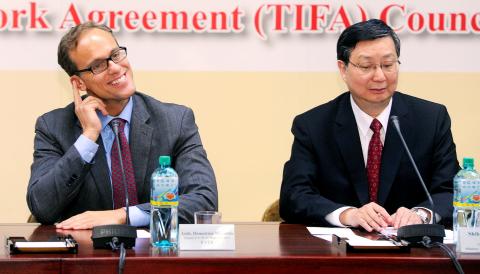Taiwan and the US yesterday reached consensus on trade principles for the information and communication technology (ICT) service sector as well as international investments in the seventh Taiwan-US Trade and Investment Framework Agreement (TIFA) meeting.
Vice Minister of Economic Affairs Bill Cho (卓士昭) and Deputy US Trade Representative Demetrios Marantis told a press conference that the two sides agreed to cooperate to enhance domestic regulatory capacity and support the expansion of ICT networks and services.
Under the joint statement on trade principles for the ICT service sector, Taiwan and the US agreed to share information and experience with each other on legislation, regulations and programs in areas relevant to promoting the ICT service sector.

Photo: Wang Min-wei, Taipei Times
A consensus was also reached on “political commitments” to ensure sustained bilateral trade and investment, with the two governments agreeing to create an open and non-discriminatory investment climate, and supporting a fair market in which state-run enterprises will not enjoy preferential treatment.
Cho said the principles for international investments are expected to enhance bilateral trade ties, create jobs, enhance economic growth and intensify promotion of a “Taiwan-US Investment Agreement.”
Marantis said the US recognized Taiwan has a strong interest in signing a free-trade agreement (FTA) with the US and joining the Trans-Pacific Partnership (TPP), a proposed free-trade agreement aimed at liberalizing economies in the Asia-Pacific region and fostering international trade.
Taiwan cannot be “invited” unilaterally by the US to join the TPP, but must prove it can meet obligations affecting the interests of 12 current member economies including the US, he said.
Marantis also said the US had raised the issue of importing more US meat products to Taiwan, but did not win support from Taiwan’s representatives, because of the Taiwanese government and its citizens’ concerns that US meat products may contain residues of the livestock feed additive ractopamine.
“We understand this is a longstanding concern of Taiwanese, but we will continue promoting the trade of US meat products and proving the quality of our product is consistent with international standards,” he said.
The US representative avoided specifying that he was referring to pork, and talked about “meat products” throughout. Cho did not comment on the issue.
The two sides have agreed to schedule the eighth round of TIFA talks next year in Washington, Marantis said, adding that the US expects future talks to be an annual event.
The Ministry of Economic Affairs will establish two sections for talks under TIFA to negotiate with the US about solutions to technical barriers to trade and bilateral investment, Cho said.
He added that the government would seek further assistance from the US on access to the TPP and would liberalize laws and regulations to try to meet its requirements.

AGING: As of last month, people aged 65 or older accounted for 20.06 percent of the total population and the number of couples who got married fell by 18,685 from 2024 Taiwan has surpassed South Korea as the country least willing to have children, with an annual crude birthrate of 4.62 per 1,000 people, Ministry of the Interior data showed yesterday. The nation was previously ranked the second-lowest country in terms of total fertility rate, or the average number of children a woman has in her lifetime. However, South Korea’s fertility rate began to recover from 2023, with total fertility rate rising from 0.72 and estimated to reach 0.82 to 0.85 by last year, and the crude birthrate projected at 6.7 per 1,000 people. Japan’s crude birthrate was projected to fall below six,

US President Donald Trump in an interview with the New York Times published on Thursday said that “it’s up to” Chinese President Xi Jinping (習近平) what China does on Taiwan, but that he would be “very unhappy” with a change in the “status quo.” “He [Xi] considers it to be a part of China, and that’s up to him what he’s going to be doing, but I’ve expressed to him that I would be very unhappy if he did that, and I don’t think he’ll do that. I hope he doesn’t do that,” Trump said. Trump made the comments in the context

SELF-DEFENSE: Tokyo has accelerated its spending goal and its defense minister said the nation needs to discuss whether it should develop nuclear-powered submarines China is ramping up objections to what it sees as Japan’s desire to acquire nuclear weapons, despite Tokyo’s longstanding renunciation of such arms, deepening another fissure in the two neighbors’ increasingly tense ties. In what appears to be a concerted effort, China’s foreign and defense ministries issued statements on Thursday condemning alleged remilitarism efforts by Tokyo. The remarks came as two of the country’s top think tanks jointly issued a 29-page report framing actions by “right-wing forces” in Japan as posing a “serious threat” to world peace. While that report did not define “right-wing forces,” the Chinese Ministry of Foreign Affairs was

PREPAREDNESS: Given the difficulty of importing ammunition during wartime, the Ministry of National Defense said it would prioritize ‘coproduction’ partnerships A newly formed unit of the Marine Corps tasked with land-based security operations has recently replaced its aging, domestically produced rifles with more advanced, US-made M4A1 rifles, a source said yesterday. The unnamed source familiar with the matter said the First Security Battalion of the Marine Corps’ Air Defense and Base Guard Group has replaced its older T65K2 rifles, which have been in service since the late 1980s, with the newly received M4A1s. The source did not say exactly when the upgrade took place or how many M4A1s were issued to the battalion. The confirmation came after Chinese-language media reported